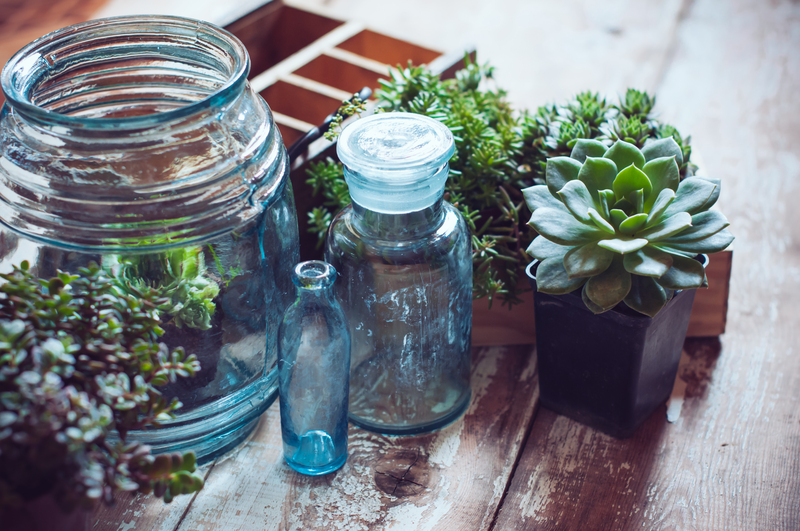Mastering the Art of Waste Prevention at Home
Posted on 07/10/2025
Mastering the Art of Waste Prevention at Home: Your Ultimate Guide
Waste prevention at home isn't just about tidying up or recycling--it's about developing a mindful relationship with resources, rethinking our habits, and actively working toward a more sustainable lifestyle. Mastering the art of waste prevention at home can save you money, reduce your environmental impact, and help cultivate a healthier, more conscious way of living. In this comprehensive guide, you'll discover actionable strategies and transformative tips for preventing waste in every area of your household.
Understanding Waste Prevention: Why It Matters
Preventing waste at home is far more effective than managing it afterward. The environmental and personal benefits go beyond a cleaner home:
- Reduced landfill contribution: Less garbage means fewer overflowing landfills.
- Resource conservation: Less waste translates to fewer natural resources used.
- Saves money: Smart consumption means spending less.
- Promotes mindfulness: Waste reduction requires awareness and thoughtful choices.
- Healthier environment: Less waste means reduced pollution and cleaner surroundings.
By mastering waste minimization at home, you're directly contributing to a healthier planet and setting a positive example for others.

Key Principles to Prevent Household Waste
There are some fundamental principles you can follow to succeed in waste prevention at home:
- Refuse what you don't need
- Reduce what you do use
- Reuse as much as possible
- Recycle properly and last
Let's break down these core strategies for a more eco-friendly home:
1. Refuse: The Power of Saying No
The first--and arguably most important--step in home waste prevention is learning to refuse unnecessary items:
- Say no to single-use plastics like straws, cutlery, and plastic bags.
- Politely decline promotional freebies you won't use (think pens, flyers, or keychains).
- Opt out of junk mail and unnecessary packaging wherever possible.
Refusing these items at the source ensures they never become part of your waste stream to begin with.
2. Reduce: Consuming with Intention
Waste reduction in your household hinges on cutting back on consumption through conscious choices:
- Buy in bulk and avoid individually packaged products.
- Plan meals to minimize food waste.
- Borrow or rent rarely used items instead of buying new.
- Choose quality over quantity--investing in better-made items that last longer.
With these steps, you foster a minimalist lifestyle and decrease your environmental footprint.
3. Reuse: Creative Ways to Extend Product Life
The next step in domestic waste prevention is to reuse items wherever possible:
- Repurpose glass jars for food storage, crafts, or organizing small items.
- Use cloth shopping bags instead of plastic ones.
- Repair appliances, clothing, and furniture rather than discarding them.
- Donate or sell items you no longer use--one person's waste is another's treasure!
Be imaginative! Practicing reuse not only minimizes household waste but also encourages innovation and community sharing.
4. Recycle: Doing It Right
While recycling comes after refusing, reducing, and reusing, it's still a crucial element of effective waste prevention at home. Make sure you recycle properly:
- Rinse containers before recycling to avoid contamination.
- Know your local recycling rules--improper disposal can send good recyclables to landfills.
- Set up a convenient, clearly-labeled station for recyclables.
Remember: Not everything can be recycled, but by following these steps, you maximize your impact.
Common Sources of Household Waste (and How to Prevent Them)
1. Food Waste
Approximately one-third of global food production is wasted each year. Food waste prevention at home is vital. Here's how:
- Meal planning: Shop with a list and avoid impulse buys.
- Proper storage: Store produce correctly to extend freshness.
- Composting: Transform food scraps into nutrient-rich compost for gardens or houseplants.
- Cook creatively: Use leftovers in soups, salads, stir-fries, or casseroles.
Adopting these habits ensures less food ends up in the trash--and more ends up nurturing your body or your garden.
2. Packaging and Plastic Waste
Single-use packaging and plastic are leading sources of household waste. To combat this:
- Bring your own shopping bags, produce bags, and reusable containers.
- Buy from bulk stores or farmers markets to cut packaging waste.
- Choose products with minimal or compostable packaging.
Small changes here make a big difference in waste reduction at home.
3. E-Waste (Electronic Waste)
With technology evolving rapidly, electronic waste is a growing concern. Here's how to prevent it:
- Maintain and clean devices to extend their life.
- Donate or sell unused electronics.
- Use certified e-waste drop-off points for proper recycling.
Never throw electronics in regular trash--they contain hazardous materials that must be handled responsibly.
4. Paper Waste
Piles of mail, receipts, packaging, and office paper quickly accumulate. Strategies to curb paper waste include:
- Switch to digital bills, magazines, and notes.
- Reuse paper for scratch notes or crafts before recycling it.
- Refuse junk mail by signing up for a mail preference service.
These changes save trees, water, and energy, making your home's waste stream leaner.
Practical Tips for Mastering Waste Prevention at Home
In the Kitchen
- Buy loose produce instead of pre-packaged.
- Start a kitchen compost bin for vegetable scraps.
- Use beeswax wraps or reusable food containers instead of plastic wrap and bags.
- Get creative with leftovers to reduce food waste.
In the Bathroom
- Switch to bar soap, shampoo bars, and refillable toiletries.
- Use washable cotton rounds instead of disposable pads.
- Opt for toilet paper made from recycled materials.
In the Closet
- Buy second-hand or quality-made clothing that lasts longer.
- Host clothing swaps with friends or community groups.
- Repair damaged clothes and donate items you no longer wear.
For Cleaning & Maintenance
- Make your own cleaning products in reusable bottles.
- Choose reusable cloths instead of paper towels or wipes.
- Maintain home appliances to prolong their lifespan.
Building a Waste-Preventing Mindset
Mastering the art of waste prevention at home isn't just about following checklists. It's about adopting a mindset of mindfulness and responsibility where each action is weighed against its environmental cost. Here's how to foster this new approach to living:
- Educate yourself and your family on sustainability issues.
- Involve kids in sorting recycling, composting, and crafting from reusable materials.
- Share your successes and learnings with friends and neighbors; inspire others in your community.
- Celebrate progress rather than aiming for perfection. Every small step counts!
Embracing Zero-Waste Living
If you want to advance your home waste reduction journey even further, consider exploring the principles of zero-waste living:
- Pursue a goal of sending as little to landfill as possible.
- Make "refill, reuse, repair, and rot" your household's mantras.
- Shop at zero-waste stores using your own containers.
- Support brands with circular models and ethical packaging.
Zero-waste living doesn't happen overnight, but every step towards it amplifies the impact of waste prevention at home.
Tools and Resources for Home Waste Prevention
If you're serious about domestic waste minimizing, these tools can help:
- Compost bins--for backyard or countertop use.
- Reusable produce bags, containers, and bottles.
- Repair kits for clothing, bicycles, and household items.
- Meal planning apps to help reduce food waste.
Many local councils also offer workshops, pickup programs, and educational resources--take advantage of these to further your skills in waste prevention.
Eco-Friendly Habits for Long-Term Success
True mastery of waste prevention at home comes down to daily habits. Here are some enduring ways to keep your household on track:
- Audit your bins monthly--see what's still being thrown away.
- Stay updated on your city's recycling regulations.
- Prioritize buying from local producers and low-packaging brands.
- Continually look for new ways to reuse or reduce.
Be patient with the process! Sustainable change is incremental, and perseverance is key.

The Benefits of Mastering Waste Prevention at Home
The rewards for reducing household waste are far-reaching. By integrating these practices, you'll notice:
- Lower grocery and utility bills
- Less clutter and more organized spaces
- Reduced carbon footprint
- Enhanced sense of accomplishment and purpose
- A better, cleaner neighborhood for all
The impact also ripples out--when friends and neighbors see your commitment to preventing waste at home, it inspires collective change.
Conclusion: Make Waste Prevention a Way of Life
Mastering the art of waste prevention at home is an empowering, ongoing journey with benefits for both your household and the wider world. By embracing mindful consumption, simple eco-friendly swaps, and a proactive mindset, you can significantly reduce your environmental impact and encourage others to follow your lead.
Start small, celebrate each success, and remember: every action counts in the creation of a more sustainable, waste-free future!
If you enjoyed this comprehensive guide, share it with someone looking to live more sustainably, and check out more resources on sustainable living and eco-friendly tips!
Latest Posts
Discover Easy Plant Pot Disposal Ideas
Sustain Your Clean Space with These Ongoing Clutter Control Strategies
Innovative Approaches to Decrease Household Waste
Transform Your Space: Pre-Party Cleaning Checklist for a Welcoming Atmosphere
Clear Your Clutter, Clear Your Mind - Stress Relief Through Organization

 020 3795 6999
020 3795 6999 020 3795 6999
020 3795 6999




 House clearance
House clearance Rubbish collection
Rubbish collection Here at Rubbish Junk we give you the unique opportunity to keep your home free of clutter at prices that will constantly please you. Other domestic clearance companies in London might be...
Here at Rubbish Junk we give you the unique opportunity to keep your home free of clutter at prices that will constantly please you. Other domestic clearance companies in London might be... Rubbish Junk knows what to do to keep your home rubbish-free. When you are facing a situation that requires clearance services,...
Rubbish Junk knows what to do to keep your home rubbish-free. When you are facing a situation that requires clearance services,...



